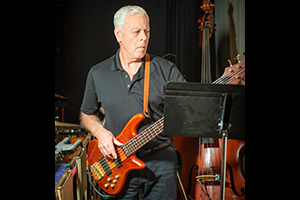If not now, when?
By Jon Liebman
February 17, 2023
Where did the time go?
You’re not a teenager. You’re not a college student. You’re well past the career planning stage.
At this point in your life, you’re ready to do something just for you. And that something is learning bass.
I understand it’s a new beginning for you, even if you’ve dabbled with bass or guitar over time.
What’s more, you’re probably moving more slowly than you used to, not to mention dealing with arthritis, tendonitis, or any of those other nuisances that happen to us when we get older.
You don’t like the idea of getting such a late start, but you can’t rewind the clock. You’re ready to take action.
It’s never too late
As I’m always saying, “You’re never too old and it’s never too late to experience the joy and the pleasure of making music.”
I got some encouraging perspectives on the subject from bassist Jeff Ganz during a recent conversation published as this week’s FBPO interview.
Throughout his amazingly varied career, Jeff’s played with everyone from Johnny Winter and Ben Vereen to Rita Moreno and the Village People (and just about everyone in between).
Jeff shared some of his own story too, providing uplifting thoughts for the “over 50” group of people who want to learn bass.
“I’m thinking that after years and years and years of doing things that they didn’t want to do to make a living,” Jeff says, “that if not now, when? They want to do this.”
Play what you want to play
Most people in that category aren’t setting out to be virtuoso bass players. And I’m guessing that includes you too. I’m talking about people who are more interested in playing the music that got them interested in learning bass in the first place.
“They don’t necessarily want to play ‘Continuum,’ says Jeff, “and they don’t necessarily want to play ‘Donna Lee.’ They want to play ‘Whipping Post,’ they want to play ‘Paperback Writer.’”
Makes sense to me. People want to play the music they listened to growing up, the music that has the deepest meaning for them.
“They probably all went online,” says Jeff, “searching out the Greg Lakes and the Jack Casadys and all of these people because now they can talk the talk.”
What about music theory?
So, does that mean they don’t have to learn music theory and the rest of the “under the hood” stuff when it comes to learning bass?
“They don’t want to necessarily do a deep dive into the mechanics of the instrument,” Jeff says, “if it’s not going to serve their initial desire to replicate what they heard when they were kids.”
I explained to Jeff that most of my students do want to learn theory and they do want to understand what’s behind the notes.
That’s when he told me of his own experience as a young, working musician who hadn’t had a lot of formal training. It wasn’t till the situation required him to learn to read music and to understand what was behind the notes that the lights went on.
“In my case,” he says, “all it did was help me play anything I wanted to play better. It made me knowledgeable of what I was playing. It was all chicken/egg, egg/chicken to me. There were no real rules other than when I started doing a deeper dive into it.”
This part’s optional. But…
So, while some might think doing a deeper dive into music is optional, there are some definite advantages to learning music theory in the way it helps you understand what you’re doing while you’re playing.
I’ve taught well over 100,000 how to play bass. In the Bottom Line Club, my membership program at For Bass Players Only, students feel they’re able to find the optimum balance between what they’re doing and why they’re doing it.
Bottom Line Club students love what they’re learning and are constantly discovering new ways to look at how songs are constructed and how to supply a bass line that totally fits the style.
What’s more, the lessons and courses in the Bottom Line Club are structured with my trademarked Groove Grower™ framework, affording students the ability to start very simple and progress at their own pace, getting remarkable results.
Even with arthritis, tendonitis, and all that other stuff.
If it sounds like I’ve been describing you, then the Bottom Line Club might be what you’re looking for.
Learn to play the music you love. And you can go as deep as you want.
It doesn’t matter how old you are. There’s nothing wrong with starting later in life. Playing bass is a blast!
If not now, when?
Find out all about joining the Bottom Line Club here.
Let’s play bass!
Jon






I’m in full agreement with everything. Understanding the theory helps me learn faster.
Glad to hear it, Ted. Thanks!